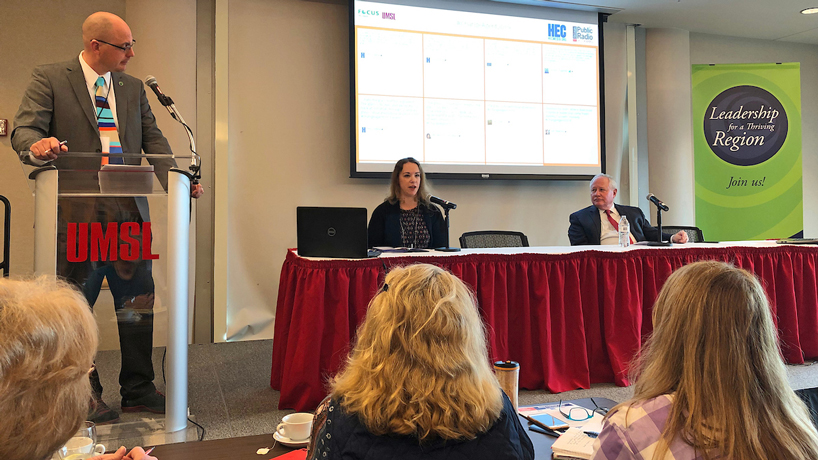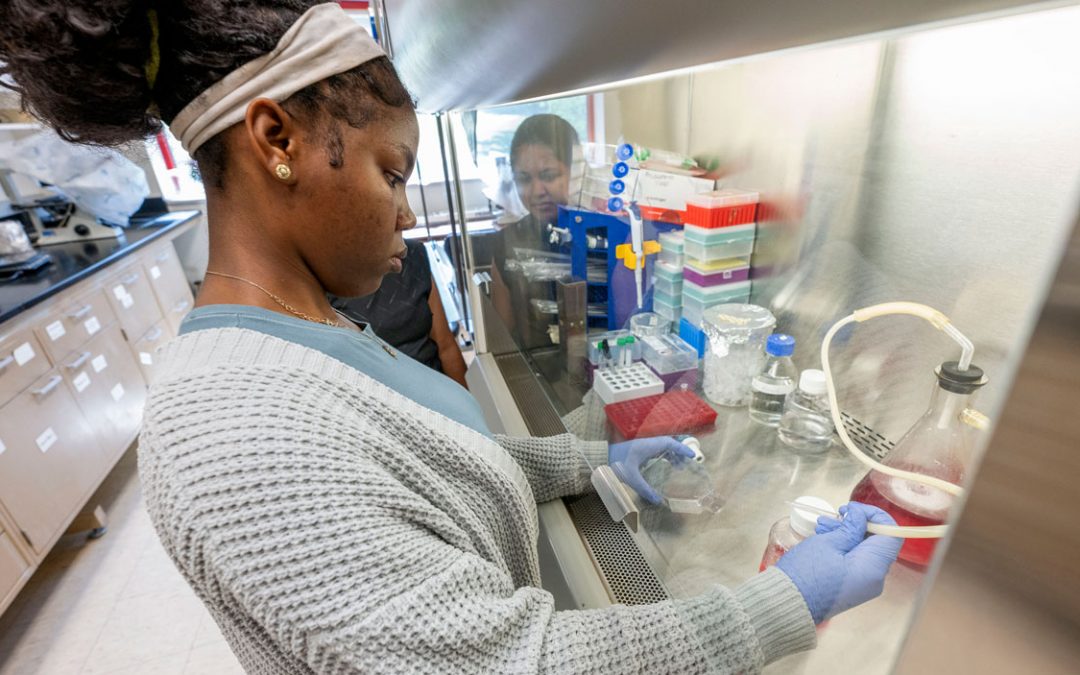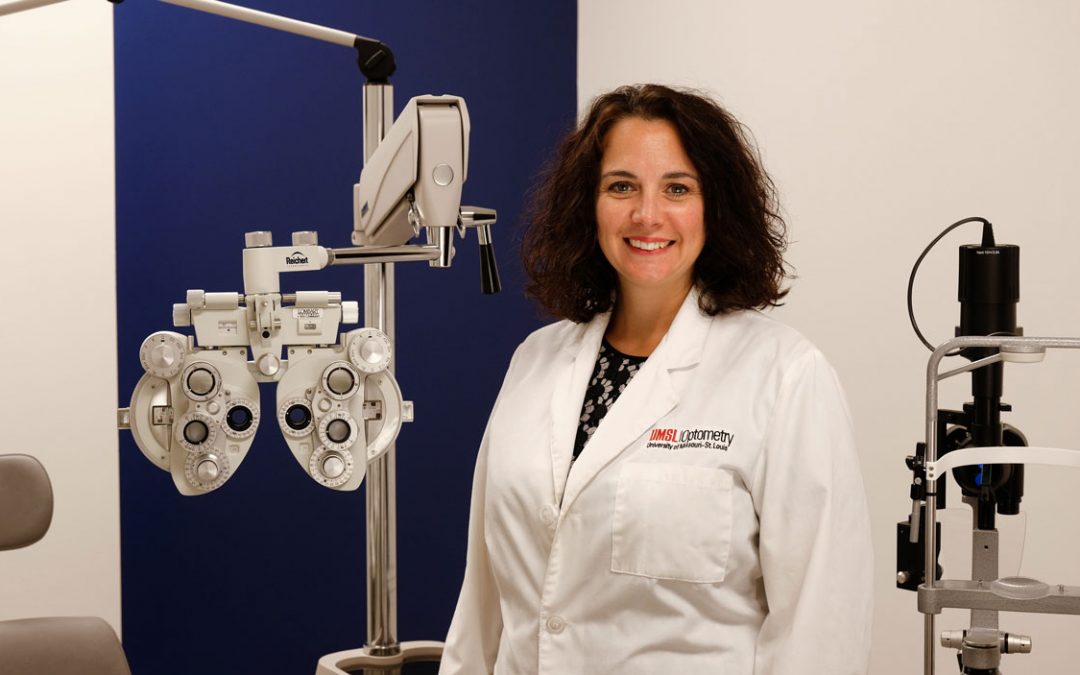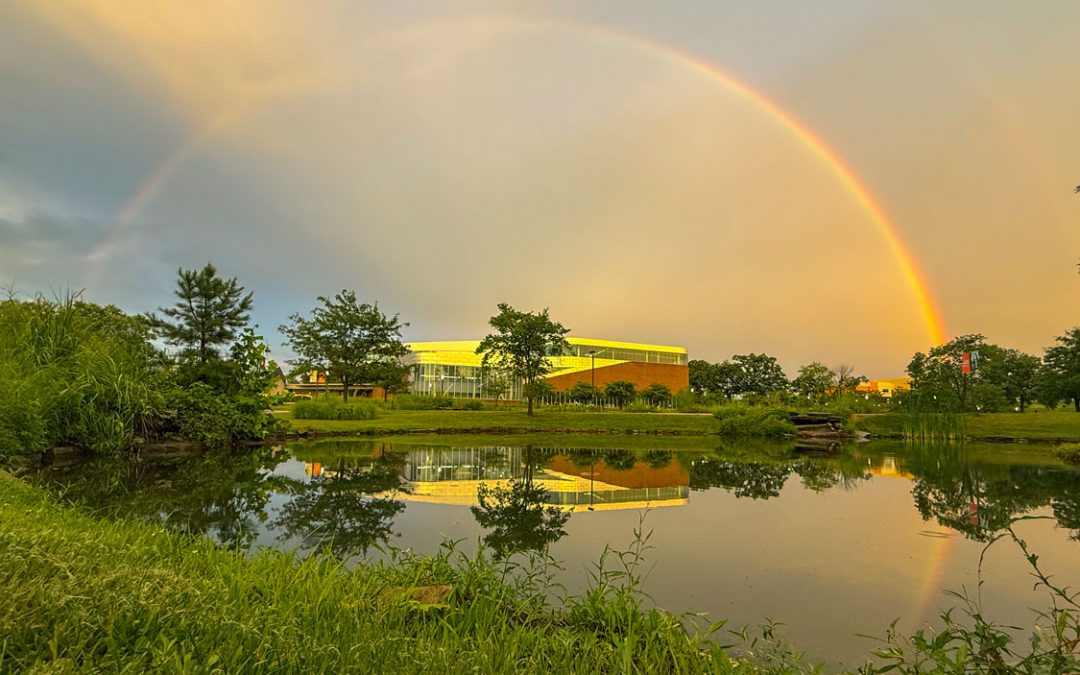
Wally Siewert (at left), the director of civic engagement at FOCUS St. Louis, and The Bulwark’s William Kristol (at right) listen as writer and scholar Sarah Kendzior (center) addresses a question during the seventh annual Public Values Symposium on Friday at the Millennium Student Center. (Photo by Steve Walentik)
William Kristol and Sarah Kendzior don’t appear to have too much in common.
He’s a long-established neoconservative political analyst in his 60s, living just outside Washington, DC, who founded The Weekly Standard, serves as editor-at-large of The Bulwark and can still be found frequently sharing his opinions on cable television news.
She’s a liberal-leaning writer and scholar, more than 20 years his junior, who lives in St. Louis and rose to prominence much more recently through social media and her best-selling book, “The View from Flyover Country,” a collection of essays she penned for Al Jazeera.
But they share similar concerns about the state of democracy in the United States – and around the globe.
Wally Siewert, a former University of Missouri–St. Louis faculty member and current director of civic engagement at FOCUS St. Louis, brought them together for the seventh annual Public Values Symposium, titled “Being a Change Agent in a Divided Nation.”
Friday’s event attracted roughly 80 civically engaged people – among them nonprofit leaders, elected officials, organizers, consultants and media members – to the Century Rooms of UMSL’s Millennium Student Center.
“We’re at a time in this country where a whole lot of change is possible. There are a whole lot of things up in the air,” Siewert said. “Simultaneously, we have a political system that seems to be gridlocked. It seems to be incapable of making basic governing decisions, installing budgets, understanding what people need to live their day-to-day lives, setting aside kind of high ideological goals.
“So how do those two things come together? If change is possible because of the many things that are up in the air, but we have a political system that isn’t doing it, how can we change that? Where can we start to tip the scales?”
He liked the idea of hearing from both Kristol and Kendzior as a means of highlighting where people from different political perspectives are aligned, creating opportunity to enact change.
Siewert, the former director of the Center for Ethics in Public Life at UMSL, has brought people from across the political spectrum together before for in-depth discussions about such issues as rampant partisanship, campaign finance reform and the level of control political parties should wield over candidates, financial resources and policy decisions.
Kristol delivered the keynote address to open this year’s conference, following past keynote speakers such as former Senator Olympia Snowe, former Congressman Mickey Edwards and journalist/author Jeremy Scahill.
Kristol used his talk, in part, to make a case for American institutions, which he believes have helped create prosperity over the past several decades and continue to provide stability amid current turbulent political times.
“It’s not like nothing has been accomplished in the last 70 years,” Kristol said. “The last 70 years have been a pretty amazing, I would argue, success story in terms of the international global order compared to the preceding 50-70 years. There were some pretty impressive successes here at home and elsewhere in the world in terms of social change, economic progress. You really don’t want to be cavalier about these things.”
He added, “One of the big stories of the last two years for me has been the strength of American institutions, which is a good thing.”
Kendzior offered a response that cast issues in the United States in a bleaker light.
“America has been in decline since before I was born,” she said. “You can look at widespread corruption in individual crises like Watergate, like Iran Contra, like the 9/11 aftermath, the war in Iraq, the 2008 financial crisis. These were not countered at the time. We did not see repercussions and consequences for brazen criminality at the time. If we had, we would be in a different place.”
She later added, “Denial is what got us here. Acquiescence is what got us here. Belief in American exceptionalism is what got us here. Belief in institutionalism, in checks and balances as a fail-proof mode of democracy got us here. Because checks and balances are only as good as those who uphold them.”
The two shared the dais for a joint question-and-answer session that provided a glimpse at where Kristol and Kendzior see eye-to-eye, including on the importance of people speaking up for what they believe in the face of eroding societal norms.
The symposium also featured concurrent breakout sessions meant to examine issues more specific to the St. Louis region.
Siewert moderated a panel on crossing party lines that included Republican state Rep. Shamed Dogan; Sean Nicholson, principal of GPS Impact and an organizer of the Clean Missouri campaign; Robert Schaaf, co-founder of Show Me Integrity; and Samantha Stangl, programs manager with the Clark-Fox Family Foundation.
Cynthia Williams, the assistant dean for community partnerships at the Brown School at Washington University in St. Louis, moderated the other panel on funding for change in a divided nation. The panelists were Maxine Clark, CEO and co-founder of the Clark-Fox Family Foundation; Bridget McDermott Flood, the executive director of the Incarnate Word Foundation; Thomas McAuliffe, the director of health policy at Missouri Foundation for Health; and Felicia Shaw, executive director of the Regional Arts Commission of St. Louis.
Media Coverage
St. Louis Public Radio














